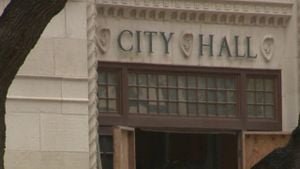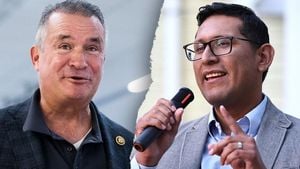America's self-described "elite" media are begging for forgiveness from the very readers and viewers they reportedly deceived during the 2024 election. Outlets like The Washington Post, CNN, and Politico appear to have drastically misjudged the political climate, confidently predicting Vice President Kamala Harris would defeat President-elect Donald Trump. Now, with the election results in hand, these same reporters seem desperate to stop their audience from fleeing to other platforms.
Politico's White House correspondent Eugene Daniels acknowledged at an event last week, "The world feels upended," conceding the media’s missteps about the election results, particularly their inability to understand Trump supporters. He reflected, “Everyone who voted for Donald Trump is not someone who hates people of color…that lack of imagination is, I think, where we have failed as an industry to serve the people...” His candid comments were part of several discussions hosted at Harvard University’s Kennedy School Institute of Politics, aiming to assess the media's role during the election.
Washington Post columnist Eugene Robinson also spoke candidly about the gravity of the media's error when asked what he missed during his coverage, laughing as he admitted, "I missed the result. I got it wrong." CNN’s Abby Phillip shared her thoughts, pointing out how journalists often end up appealing only to each other. She noted, “I think elite media increasingly communicates within its own circle, assuming their consensus is widely accepted.”
While there was no formal apology during the discussions, the consensus among journalists hinted at acknowledgment of their bias and thought processes often rooted in groupthink—a form of journalism where reporters feel pressured to align with their colleagues' views rather than exploring diverse perspectives.
This issue of groupthink has become especially pressing considering the homogenous backgrounds of many reporters today. Robinson lamented how the makeup of newsrooms has shifted, saying, "Newsrooms used to have many working-class reporters, many without college degrees. Now, they’re filled with well-educated individuals coming from similar backgrounds and esteemed universities, creating a kind of intellectual conformity." This narrow viewpoint has contributed to the anti-Trump narrative which has dominated media coverage.
Phillip highlighted another major concern: elitism among Democratic party members. She opined, "Democrats suffer from elitism, and Republicans are now more representative of America." Phillip emphasized the urgent need for more diverse voices across the board, saying, “Otherwise, we will continue to be victims of groupthink.”
Such sentiments were echoed by Daniels, who concluded, "We don’t know everything," emphasizing the need for humility and openness within media circles. This kind of introspection might be the first step toward bridging the widening gap between what media outlets portray and what audiences actually believe or experience.
Meanwhile, Tim Walz, former vice-presidential candidate who faced significant losses with Harris, plans to address Democratic donors soon. After retaining low visibility since the disappointing election outcome, he and Harris are expected to express gratitude to financial backers, now burdened with debts from their extensive campaign spending. Despite their confidence, they recorded losses across all battleground states, and Walz, who once exuded high hopes for their campaign, has emerged more muted.
"Your support made this campaign possible," stated the invitation for the donor call, noting their continued debt. The deep-seated hope was clearly juxtaposed against the verbal recognition of challenges moving forward. Walz had emphasized his commitment to Minnesota after the election, transitioning back to his governor duties without making any definitive statements about future political aspirations.
Reflecting on the state of media coverage, it becomes clear the consequences of such uncritical thinking and lack of diversity among journalists. It's not merely about getting predictions right, but about genuine engagement with audiences and communities, respecting different viewpoints, and crafting stories reflective of the larger narratives outside newsrooms. Perhaps moving forward, both media and politicians would benefit from listening more actively to the concerns and voices of the public they aim to serve.



